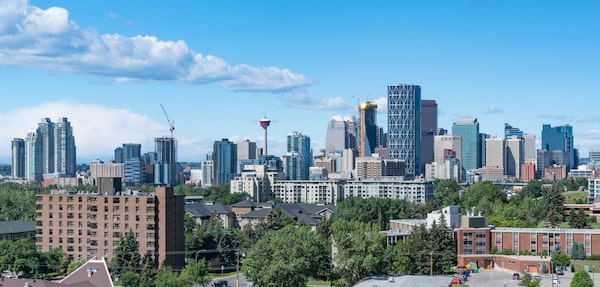
The average value of office buildings in Calgary increased by 1 per cent last year. The slight increase is a positive development for a real estate sector that withstood a 32-per-cent drop in office values in last year’s assessment.Paul Brady/iStockPhoto / Getty Images
The property values of Calgary’s downtown office buildings appear to have stabilized after a sharp drop last year but home prices are still falling, according to assessment data released Thursday by the city.
Calgary has yet to recover from a downturn in the oil sector that began in 2014, with the downtown still dotted with empty office space and sidewalks that remain quiet because of stubbornly high unemployment. However, the city’s office-space values may have finally found bottom, according to the new data.
The city’s 2020 assessment is based on the value of properties on July 1, 2019.
The average value of office buildings in Calgary increased by 1 per cent last year. The slight increase is a positive development for a real estate sector that withstood a 32-per-cent drop in office values in last year’s assessment. City assessor Nelson Karpa said that while early indications are positive for 2020, compared with the previous “dramatic decline,” he’s not yet ready to announce that a recovery is under way. “I’m not so sure I’d be prepared to call it just yet,” he told reporters at City Hall.
While retail and industrial properties are gaining value, the residential side of the city’s ledger has continued to fall after dropping by 1 per cent in the 2019 assessment. The average Calgary home lost $20,000 in value last year, about 4 per cent. Over the past two years, the value has dropped from $480,000 to $455,000. The average condominium had a slightly larger dip in value over the same two-year period.
The overall value of Calgary’s assessment roll fell to $301-billion, losing $5-billion over the past year. The province’s economy has sputtered since the summer, failing to gain steam as energy prices have remained subdued.
The struggling real estate market has had a significant impact on Calgary’s finances over the past year, leading council to consider a number of cuts to balance its budget. The city has dipped into its savings in recent years to keep tax increases down, an option that’s no longer viable, according to Calgary’s mayor.
The downtown office market, which represented one-third of the city’s tax base as recently as 2015, has seen values plummet in recent years. Tens of thousands of jobs have been lost in the city’s energy sector, pushing the unemployment rate up to 7.4 per cent in November. Delays in pipeline construction have led to concerns that a full recovery in the energy sector could be years away.
The values of some of the city’s most expensive office towers show persistent trouble in Calgary’s economy. The Bow Tower, which opened in 2013 and dominates the skyline, increased in value by 1.32 per cent to $772-million. The building was worth nearly $1-billion two years ago. A few blocks away, Bankers Hall lost another 13 per cent of its value after dropping about 20 per cent in last year’s assessment. The building, worth $895-million in 2017, is now valued at $622-million, according to its new assessment.
“The bleeding has stopped, but it’s still pretty bad out there. The question now is how long we’ll stay at the bottom and when we’ll start growing,” said Greg Kwong, the Alberta managing director for commercial realtor CBRE.
The vacancy rate in the office market is hovering around 27 per cent, according to Mr. Kwong, with about 11.5 million vacant square feet of office space, down slightly from last year but still high. “It’s a symptom of the bigger problem, which is unemployment. We have up to 80,000 people who were working in the downtown core five years ago who aren’t there anymore. Ultimately we need to get the oil patch back on its feet,” he said.
Alberta’s protracted economic downturn extended to Edmonton, where the capital city’s residential market experienced a 2.7-per-cent decrease, according to its assessment unveiled on Thursday. The value of the average commercial and industrial property in Edmonton fell by 2.9 per cent over the past year.
We have a weekly Western Canada newsletter written by our B.C. and Alberta bureau chiefs, providing a comprehensive package of the news you need to know about the region and its place in the issues facing Canada. Sign up today.
 Justin Giovannetti
Justin Giovannetti